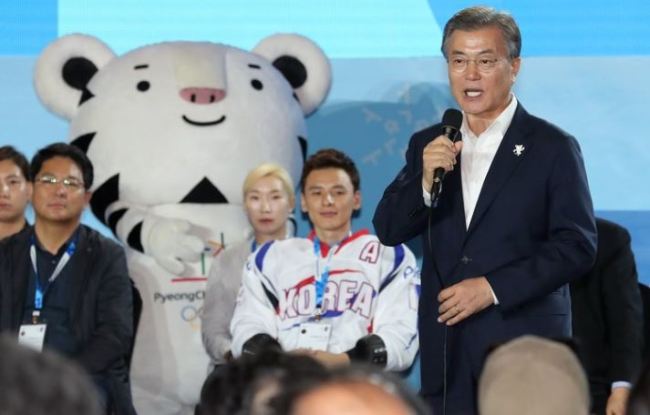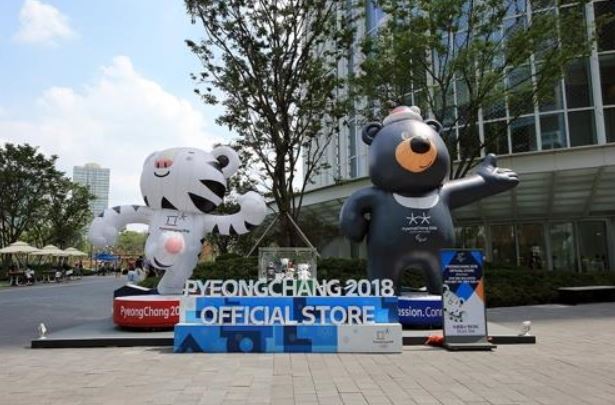PyeongChang Games may help mend soured Sino-Korean ties: experts
By YonhapPublished : Sept. 24, 2017 - 11:04
The 2018 PyeongChang Winter Olympics may serve as an opportunity for South Korea and China to restore their relationships strained by the deployment of a US missile shield here, watchers said Sunday.
The Winter Games will be held in the alpine county of PyeongChang, some 180 kilometers east of Seoul, from Feb. 9 to 25 with about 6,500 athletes and officials from 95 countries attending. It will be the first Olympics in South Korea since the 1988 Seoul Summer Games.
In mid-March, China banned the sale of group tours to Seoul in retaliation against the installation of a Terminal High Altitude Area Defense battery in southeastern South Korea, which Beijing sees as a security threat.
The move has sent the number of Chinese visitors to South Korea tumbling, hitting the local tourism industry hard. South Korea's Hyundai Motor and Lotte groups have taken a big hit in the wake of China's retaliation.
Industry sources said the upcoming quadrennial sports showcase may improve the strained ties between economic powerhouses in Asia. During a summit in Berlin in July, South Korean President Moon Jae-in invited his Chinese counterpart Xi Jinping to visit Seoul on the occasion of the Winter Games.
The Winter Games will be held in the alpine county of PyeongChang, some 180 kilometers east of Seoul, from Feb. 9 to 25 with about 6,500 athletes and officials from 95 countries attending. It will be the first Olympics in South Korea since the 1988 Seoul Summer Games.
In mid-March, China banned the sale of group tours to Seoul in retaliation against the installation of a Terminal High Altitude Area Defense battery in southeastern South Korea, which Beijing sees as a security threat.
The move has sent the number of Chinese visitors to South Korea tumbling, hitting the local tourism industry hard. South Korea's Hyundai Motor and Lotte groups have taken a big hit in the wake of China's retaliation.
Industry sources said the upcoming quadrennial sports showcase may improve the strained ties between economic powerhouses in Asia. During a summit in Berlin in July, South Korean President Moon Jae-in invited his Chinese counterpart Xi Jinping to visit Seoul on the occasion of the Winter Games.

Moon and Xi may "make a decision" to iron out the conflict over the missile defense system should the Chinese leader pay a visit to Seoul next year, they said.
"We hope that the PyeongChang Games will serve as a chance to eliminate negative factors for the South Korean economy, such as China's retaliation against South Korea over the THAAD deployment and North Korea's nuclear risk," an industry watcher said. "South Korean companies' active marketing activities during the games will likely help tide over the crisis."
China's retaliatory measures have dealt a harsh blow to South Korean companies. Hit hardest is retail giant Lotte Group that has invested more than 8 trillion won ($7.1b) in China.
Lotte Group is now in negotiations with foreign companies to sell its discount store chain in China, having decided to withdraw from that market following Beijing's retaliation.
About 80 percent of the 112 Lotte Mart stores in China have been closed for more than six months following a series of economic measures taken by China against Lotte's land-swap deal with the Seoul government to host the US missile defense system. Lotte Mart's damage is expected to reach 1 trillion won by the end of this year.

Lotte exchanged its golf course in the southeastern county of Seongju, where the THAAD battery is now being installed, for a lot of land near the South Korean capital of Seoul.
On the domestic market, Lotte's duty-free business has been floundering due to a tumble in the number of Chinese tourists.
Lotte officials expected the upcoming Winter Olympics to come as an occasion for China to start relaxing its retaliatory measures.
"The PyeongChang Games will be a global sports festival, so we hope they will serve as an opportunity to resolve conflicts and misunderstandings between countries," said an official of Lotte, an official sponsor of the Olympics.
Lotte is not alone. Hyundai Motor Co. and Kia Motors Corp. -- South Korea's top two automakers -- also want the Winter Games to become a turning point in Sino-Korean relations as the prolonged diplomatic tension has battered its operations there.
"Hyundai and Kia will introduce their eco-friendly and self-driving technologies to Chinese athletes and tourists who are expected to visit South Korea during the games, thus refurbishing their image to consumers in China," a Hyundai Motor Group official said.
Hyundai Motor and Kia Motors, the flagships of the world's fifth-largest automaker Hyundai Motor Group, have been designated as domestic sponsors of the PyeongChang Games, and they plan to provide hydrogen fuel cell electric vehicles and self-driving cars for the Olympics.
The hope comes amid their plunging sales in China. Hyundai and Kia sold a combined 576,974 vehicles in the world's largest car market in the first eight months of this year, down a whopping 44.7 percent from the same period a year earlier.
Concerns are growing that the combined sales of Hyundai and Kia may drop below the 7 million mark this year, retreating to a level posted six years earlier.
Despite rising hopes, some watchers offer a pessimistic outlook, saying the PyeongChang Winter Olympics may not help ease China's retaliation dramatically.
"There are no signs of China lifting its retaliatory measures that have been in place for more than six months," an industry source said. "It may take a long time for things to return to normal even if China decides to end its retaliation." (Yonhap)







![[KH Explains] How should Korea adjust its trade defenses against Chinese EVs?](http://res.heraldm.com/phpwas/restmb_idxmake.php?idx=644&simg=/content/image/2024/04/15/20240415050562_0.jpg&u=20240415144419)











![[Today’s K-pop] Stray Kids to return soon: report](http://res.heraldm.com/phpwas/restmb_idxmake.php?idx=642&simg=/content/image/2024/04/16/20240416050713_0.jpg&u=)